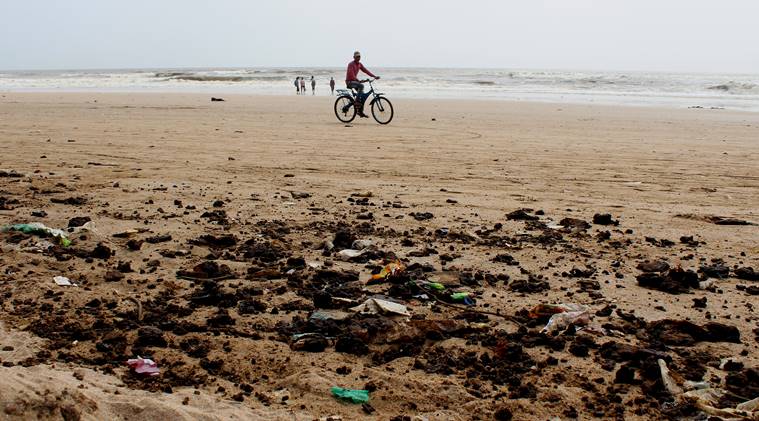Washed ashore: How the sea changed, from a childhood friend to an angry, implacable force
As I continued to read and talk to people about the sea, it baffled me that one thing could have so many facets to it. But with this bafflement came a desire to understand, and my hostility faded to the background.
 The sea will always be there, and be whatever I need it to be, until the moment it decides not to play along. (Source: Express Photo by Nirmal Harindran)
The sea will always be there, and be whatever I need it to be, until the moment it decides not to play along. (Source: Express Photo by Nirmal Harindran)
When one grows up in Kanyakumari, where “two seas and an ocean meet”, the roaring waves are not an unusual sight. But things changed when, at nine years of age, I came across a tattered, abridged version of Jules Vernes’s 20,000 Leagues Under the Sea in my school library. With an illustration of the famous submarine Nautilus and a giant squid on the cover, the book’s depiction of an exotic, dangerous world beneath the sea bewitched me. While the encounter cost me a lunch period and a scolding from the librarian, it transformed the beach from a mundane location to a fixation — one that endures to this day.
But the imaginary great white shark hunts in knee-high water did not last long. On December 26, 2004, one of the worst natural disasters in recent memory struck in the form of a tsunami. It devastated 14 countries, my own district as well. While we were on way to a holiday in Kerala, calls and messages began to flood my parents’ phones. Many of our relatives and friends had come to town to attend a function at our house, and quite a few had stayed on — of them, many were either badly injured or killed by the monster waves.
It was, initially, impossible for me to come to terms with what had happened. I had always lived just far enough from the sea to see it as a friendly, genial companion. Those who lived along the coast, depending on it to survive, knew all too well how capricious it could be. But, in my mind, the tsunami had been caused by a villain of sorts — no different than the caricature-like characters I watched on TV.
But, with the blinders off, I could no longer ignore the thousand other stories that played out on the beach every day — the bored policemen who patrolled the area, drinking countless cups of tea from a tiny tea stall, the “park” (two swings and a slide) where children were kicked into so the adults could enjoy some peace and quiet, the man with a scar on his face, who sold tragically short-lived balloons to ecstatic children and grumbling parents, the drunken group of men whom everyone hoped would fall face-first into the sand at some point in the evening.
 Soon, high school came around, and my relationship with the sea changed yet again. It became a reservoir into which I could dump the flood of feelings within me. (Source: Express photo by Santosh Parab)
Soon, high school came around, and my relationship with the sea changed yet again. It became a reservoir into which I could dump the flood of feelings within me. (Source: Express photo by Santosh Parab)
The scale continued to teeter for years, though I did not stay away from the sea for long. It began with a family drive through the coast to confront the damage, with me in the back seat of our car, glancing at each wave with fearful mistrust. What I saw then was the beginning of lives being rebuilt — houses, churches, schools, boats and stores were slowly being repaired, and wounds were beginning to scab over. Confronted by the reality of what had transpired, I could no longer hold to my fiction.
The next few years were marked by an uneasy detente. Our visits to the shore soon resumed their previous frequency, but my wariness remained. As I read through Vernes’s story again, and moved on to Samuel Coleridge’s The Rime of the Ancient Mariner, I discovered a new and frightening side of the sea — a primordial entity which had to be regarded with fear, not treated as a benign companion. As I continued to read and talk to people about the sea, it baffled me that one thing could have so many facets to it. But with this bafflement came a desire to understand, and my hostility faded to the background.
Soon, high school came around, and my relationship with the sea changed yet again. It became a reservoir into which I could dump the flood of feelings within me. The sea was vast, I told myself, it could take this and more. So, I readily and hungrily dumped it all — social unease, loneliness, mood swings, anger and frustration. The sea was an attentive listener, and at the same time, a constant talker. It was, at times, the only thing that could still my anxious thoughts, or make the happy ones glow for hours afterwards.
During my college days, I sounded off with the familiarity of a long-lost friend about love, heartbreak, social acceptance and how terrible hangovers could be.
The first time I was well and truly landlocked for any significant amount of time was a year and a half ago, when I moved to New Delhi. Recreating that feeling of serenity with the odd lake or occasional puddle of stagnant water proved to be hard, despite trying to keep an open mind on the subject. With my entry into adulthood marked largely by bank forms, taxes and credit card bills, there will presumably be many things to talk about when I next happen upon that familiar landscape.
The sea will always be there, and be whatever I need it to be, until the moment it decides not to play along. The terms of this agreement will have to be revisited; this much is inevitable. But until then, perhaps, the old days could come back. Seaweed and seashells might once again morph into the fantastical creatures of my childhood, if only for a few seconds. That might not be such a bad thing, after all.
- 01
- 02
- 03
- 04
- 05



























